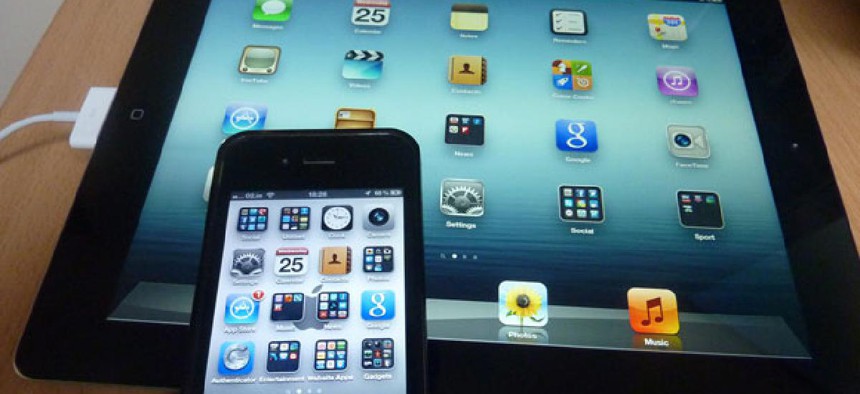iPhones and iPads Poised to Win Key Pentagon Security Nod Next Week

Flickr user smemon
The devices also earned a long sought-after governmentwide encryption certification last week.
Apple, within days, is set to finish clearing two safety hurdles that had kept the iPhone and iPad out of fingers’ way in the Defense Department and some civilian agencies.
The Pentagon is expected to approve a Defensewide guide on Tuesday for the secure use of iPhone 4s, iPad2, iPad Mini, and later devices based on the company's iOS operating system. And, already, on Friday, the National Institute of Standards and Technology announced the iPhone and iPad have earned a long sought-after governmentwide encryption certification.
A spokeswoman for the Defense Information Systems Agency, which evaluates military mobile security guidelines, told Nextgov that according to Mark Orndorff, DISA's chief information assurance executive and program executive officer for mission assurance and NetOps, "The decision is now internal to DISA for approval, and is expected to take place in the next week.”
The Defense Department will require that iOS devices first synch with a "mobile device management" system that centrally configures controls before troops can use the handhelds for work. Currently, many of Apple’s gadgets are undergoing trial runs throughout the military.
A DISA working group that vets the so-called Security Technical Implementation Guides, or STIGs, for technology hooked up to Defense networks meets the second Tuesday of every month and is anticipated to give iOS the nod on May 14.
"When the STIG is approved, the next step before users can connect iOS devices on DoD networks is establishing the mobile device management system, which is anticipated for award in early summer," said the DISA spokeswoman, Alana Casanova.
Last week, Defense sanctioned the new BlackBerry 10 smartphones and BlackBerry PlayBook tablets, as well as Samsung's Android Knox, for use on military networks. The security approvals do not mean products have been ordered, contrary to some media reports, Pentagon officials said.
The military is in the midst of shifting Defensewide communications to mobile devices with various brand names and operating systems, including BlackBerry’s handhelds.
The Canadian company has dominated the federal cellphone market for years, largely because BlackBerrys can be remotely programmed and locked down. But agencies now want to accommodate employees, particularly younger employees, accustomed to the productivity and flexibility of their personal consumer devices.
Defense officials in March said they expect to manage about 100,000 mobile devices of multiple makes and models by February 2014. Right now, military personnel are using or testing 600,000 commercial devices, including 470,000 BlackBerrys; 41,000 iOS electronics; and 8,700 Google Android systems.
Governmentwide, iOS 6.0 devices now meet NIST's Federal Information Processing Standard, or FIPS 140-2, for basic security, including data encryption and message authentication.
All federal departments are required to use FIPS accredited technology for encrypting sensitive data. But some agencies, including Immigration and Customs Enforcement and the National Oceanic and Atmospheric Administration, are able to use Apple mobile devices by installing software that layers on the mandatory protections.
(Image via Flickr user smemon)






